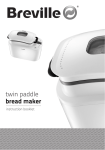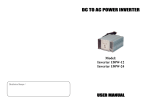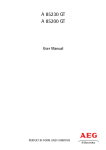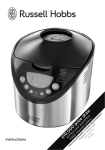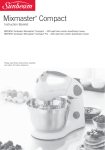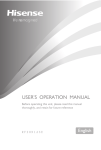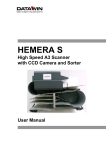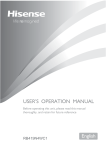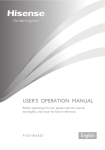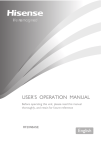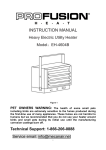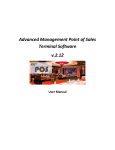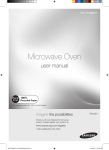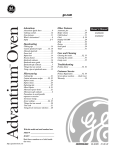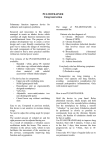Download BTBM385 - Multifunction Bread Maker
Transcript
Multifunction Bread Maker BTBM385 Important Safeguards • Always use protective oven gloves when removing cooked bread from the bread maker. Follow the instructions elsewhere in this booklet. Avoid contact with steam that may be emitted from the back and sides of the appliance while bread is cooking. When using electrical appliances, in order to reduce the risk of fire, electric shock, and/or injury to persons, basic safety precautions should always be followed, including: • Dangerous high voltages are present inside this enclosure. To avoid electric shock, Do not attempt to repair, disassemble or modify the appliance by yourself. There are no user-serviceable parts. Repairs should only be performed by qualified personnel in order to avoid a hazard. For Your Safety Read all instructions carefully, even if you are quite familiar with the appliance. • To protect against the risk of electric shock, DO NOT IMMERSE the appliance, cord set or plug in water or any other liquid. • Do not allow the power cord to hang over the edge of a table or counter, or touch hot surfaces. always ensure that hands are dry before handling the plug. • The apparatus shall not be exposed to dripping or splashing and no objects filled with liquids, such as vases, shall be placed on the product. To prevent fire or shock hazard, DO NOT expose this appliance to rain or moisture. • Do not use outdoors. Store indoors in a dry location. • Do not use with an extension lead. • Do not operate any appliance with a damaged cord or plug; after the appliance malfunctions or if it has been dropped or damaged in any way. • This appliance is not intended for use by persons (including children) with reduced physical, sensory and mental capabilities, or lack of experience and knowledge, unless they have been given supervision or instruction concerning use of the appliance by a person responsible for their safety. • Do not operate the appliance beneath curtains, or within the vicinity of any flammable materials. • Children should be supervised to ensure that they do not play with the appliance. Children should be closely supervised when using this appliance. Keep this unit out of the reach of the children. • Do not operate this appliance on, or near any hot surfaces (such as a gas or electric burner). • Never use harsh, abrasive, caustic or oven cleaners to clean this appliance. Allow to cool before cleaning. • Never leave this appliance unattended when in use. • Do not reach for an appliance that has fallen into water. Switch off at the power outlet and unplug immediately. • Switch off and remove plug from the power outlet before cleaning or when not in use. To unplug, grasp the plug and pull from the power outlet. Never pull the cord. Never carry the appliance by the cord. • Do not use this product for anything other than its intended use. This product is intended for household use only, it is not for commercial use. • The appliance should always be operated on a dry, level, heat-resistant surface. Do not operate on sinks, draining boards, uneven or inclined surfaces. • The use of attachments or accessories not recommended or sold by the appliance manufacturer may result in fire, electric shock or personal injury. • Warning: This appliance gets very hot during use, and immediately after use. Do not touch the hot surfaces. Severe burns may result from misuse. • NEVER cover the appliance in any way when in use as this may result in a fire hazard. 2 Compulsory Warning • Do not touch the moving parts of the bread maker while it is operating. If the supply cord is damaged, the cord must be replaced by the manufacturer, its service agent or similarly qualified persons in order to avoid a hazard. • During operation the bread maker will get HOT. Ensure there is sufficient distance between the bread maker and other items on the work surface, or sufficient distance between the bread maker and the confines of the area in which it is situated. We recommend a minimum clearance around all faces (including the lid when it is opened) of at least 10cm. This product has not been designed for any uses other than those specified in this booklet. Caution: The surfaces are liable to get hot during use, do not touch. • If the operating buttons are depressed unintentionally, it may affect the program in use at that time. • Never attempt to remove the bread pan during operation. Save These Instructions • The maximum quantities of bread flour and yeast for making bread must be used according a suitable recipe. Don’t overfill. This will affect the final result of the bread and may damage the bread maker, since a hazard may occur if ingredients spill over the pan as the bread rises during cooking. • Do not switch the appliance on without the bread pan in place or when it is empty as serious damage may result. • Appliances are not intended to be operated by means of an external timer or separate remote-control system. • This appliance must be earthed. Only connect it to a suitable earthed AC 240V~50Hz mains socket. • This appliance is intended to be used in household and similar applications such as: - Staff kitchen areas in shops, offices and other working environments; - Farmhouses; - By clients in hotels, motels and other residential type environments; - Bed and breakfast type environments. • Read this user manual carefully before use and save it for future reference 3 Features of Your Multifunction Bread Maker Viewing window Control panel and display Lid Body Hook Kneading/mixing paddle Removable bread pan Measuring cup Measuring spoon 4 Introduction Control Panel and Display A home made loaf costs less than half the price of a premium branded shop-bought loaf. Home made means cheaper, but it also means that you have the satisfaction of knowing exactly what goes into the food you and your family eat, and where it comes from. 1.Basic 2.French 3.Wholemeal 4.Quick 5.Sweet 6.Gluten Free 7.Dough 700g 900g Light Med Dark MENU COLOUR LOAF SIZE TIME+ START STOP 8.Cake 9.Sandwich 10.Dessert 11.Bake Your bread maker will automatically mix, knead and bake giving you delicious fresh bread with the minimum of fuss. The automatic timer feature of your bread maker means you can have freshly baked bread every morning. 1 LCD display Loaf size Crust colour Key features include: • Adjustable crust setting - light, medium or dark. Baking program • Two loaf size-small 700g,large 900g. • Automatic start - set a delay timer for up to 13 hours. • Bread and dough programs - you can use your bread maker to make dough for pizzas, or to be shaped into bread rolls, breadsticks, etc. which you can then bake in your own oven. Remaining time The display shows the Baking program, Crust Colour, Loaf size and Remaining time. Once you press the “Start/Stop” button to begin, the display will show the remaining time until the cycle is completed. When the display reads “0:00”, the bread is baked and the process is completed. Memory 2 Time+ button If power supply has been cut off during the course of bread making,the process of bread making will continue automatically within 10 minutes,even without pressing bread Start/ Stop button. If the break time exceed 10 minutes the memory cannot be kept and the bread maker must be restarted,but if the dough is not further than the kneading phase when power supply cuts off,you can press the Start/Stop button straight to continue the program from the beginning. Used when setting the delay timer to increase the time in 10 minute increments 3 Loaf Size button Selects the loaf size 700g,900g 4 Colour button Selects the crust colour Light, Medium or Dark. 5 Menu button If the power supply cut-off period is too long or if the program has past rise, the ingredients will have to be discarded and you must start again with fresh ingredients. Press this button repeatedly to select the desired baking program from 1 to 11. Each time you press the button you will hear a beep. The display shows a number for each setting. 1. BASIC 2. FRENCH 3. WHOLEMEAL 4. QUICK 5. SWEET 6. GLUTEN FREE 7. DOUGH 8. CAKE 9. SANDWICH 10. DESSERT 11. BAKE 6 Start/Stop button Start or stop the function 5 Start/Stop 6. Gluten Free: For use with those breads that are gluten free,this program will knead , raise and bake gluten free bread,You may also add ingredients to increase flavor. This button is used for starting and stopping the selected baking program. To start a program, press the Start/Stop button once. A short beep will sound, the colon symbol (:) in the time display will flash and the program will start. All the other buttons on the control panel will be deactivated except the Start/ Stop button when the program has begun.To stop the program, press and hold the Start/ Stop button for approximately two seconds. A beep will sound indicating that the program has been switched off. 7. Dough: This program only makes the dough and will not bake the final bread only kneading, and rise. This dough setting is suitable for pizza bases, doughnuts, etc. Remove the dough to shape and bake in a conventional oven (or, in the case of doughnuts, deep fried) 8. Cake: This program can be used for recipes that contain baking powder or baking soda in place of yeast. The bread baked on this setting is usually smaller with a moist dense texture. Menu Select This button is used to select the different programs. Each time it is pressed a short beep will sound and the selected program will change. 9. Sandwich: This program will knead, raise and bake sandwich bread, for baking light texture bread with a thinner crust. 1. Basic: This program is primarily used for breads that use white flour, although some recipes may include small quantities of wholemeal flour. The bread will be slightly denser than French or Sweet breads, as there are fewer rising cycles and the overall cycle time is shorter. 10.Dessert: This program can knead, raise and bake dessert. The loaf size and delay time are not applicable. 11.Bake: This program has a baking function only, no kneading or rise. The loaf size and delay time are not applicable. This setting will bake the bread up to 1 hour and the operating time can be adjusted by pressing the TIME+ button. The adjustable time range is 10-60 minutes. This setting can be used to complete the bread baking process in case of a power failure. 2. French: Traditionally, French bread has a crispier crust and lighter texture than basic breads. These recipes do not usually include additional fats or milk. This program will knead, rise and bake within a longer rise time,The bread baked in this menu usually will have a crisper crust and light texture. Colour button 3. Wholemeal: This program is used for recipes which contain significant amounts of Wholemeal or rye flour, oats or bran. It begins with a rest period during which the flours and grains absorb the liquid - this softens the ingredients and helps them to combine properly. The program also incorporates an additional rise cycle which helps the heavier wheat and grains to expand. The colour button allows you to select the colour of the loaf’s crust. Choose from LIGHT, MEDIUM or DARK. The default crust colour is medium. The selected crust colour will be indicated on the display. Loaf Size This button allows you to select your intended loaf size - 700g or 900g. Note that the total cooking time will vary depending on the size of loaf being cooked. The default setting is 900g. The selected loaf size will be indicated on the display. 4. Quick: This program kneads, rises and bakes a loaf in less time than the Basic bread program, but the bread baked on this setting is usually smaller with a dense texture. 5. Sweet: Suitable for sweet breads with a high sugar content. 6 Time+ Before using your bread maker for the first time, check if all parts and accessories are complete and free of damage. wash the inside of the bread pan and the kneading paddle with hot soapy water. Rinse and dry thoroughly. This buttons allow you to select a delay time period if you don’t want your bread maker to start cooking immediately. You must decide how long it will be before your bread is ready by pressing the”Time+”.please note the delay time should include the baking time of program. that is,at the completion of delay time hot bread is available. At first the program and degree of colour must be selected,then press “Time+” to increase the delay time in increments of 10 minutes. the maximum delay is 13 hours. Using a damp cloth or sponge, wipe the interior of the bread maker, the inside of the lid and the exterior of the bread maker. Use only a mild detergent solution. Wash the measuring spoon and measuring cup with hot soapy water, then rinse and dry them thoroughly. Note:1.This button is not applicable for the programs Dessert and Bake. 2.For time delay baking,do not use any easily perishable ingredients such as eggs,fresh milk,fruits,onions,etc. Using Note: Never exceed the maximum capacity of your bread maker (900g). Place your bread maker away from direct sunlight, draughts, or heating appliances and radiators. These can adversely affect the operation of your bread maker and spoil the results. Keep warm Bread can be automatically kept warm for 60 Minutes after baking,if you would like to take the bread out,switch the program off with the Start/Stop button. 1. Hold the bread pan and turn it anticlockwise direction as “unlock” mark indicated on bread maker oven chamber,then lift the bread pan out of the bread maker using its handle. Using Your Bread Maker Getting to know Your Bread Maker 1 Congratulations on the purchase of your new Bread Maker. Before first using your Bread Maker, it is important that you read and follow the instructions. in this use and care booklet, even if you feel your are quite familiar with this type of appliance. Your attention is drawn particularly to the section dealing with IMPORTANT SAFEGUARDS. Find a place and keep this booklet handy for future reference. 2. Fit the kneading/mixing paddle onto the shaft in the bottom of the bread pan. The shaft has a flattened side to grip the paddle when it is rotating. Align the paddle with the flat on the shaft and press it down. This appliance has been designed to operate from a standard domestic power outlet. It is not intended for industrial or commercial use. Before first use 2 Note: Do not immerse the bread maker or power cord and plug in water or any other liquid. 7 3. Pour the liquid ingredients into the bread pan. Add the rest of the ingredients to the bread pan in the order listed in the recipe. Please reference bread recipe in page 16-19. Weigh all of your ingredients accurately because incorrect measures will produce poor results. Do not let the yeast come into contact with the salt or water prior to mixing, as this will prevent the dough from rising properly (the water will activate the yeast before the ingredients are properly mixed and kneaded). When using the delay timer, make a small well in the mound of flour and put the dry yeast into it. 7. Press the Start/Stop button. Your bread maker will start to run the selected program. To stop or cancel the program press the Start/Stop button for approximately 2 seconds. 8. At the end of the baking program the machine will beep 10 times and the Bread Maker will automatically switch to a Keep Warm cycle for 60 minutes. 9. The bread can be removed from the baking pan at the end of the baking program or any time during the KeepWarm cycle. Simply press the Start/Stop button for approximately 2 seconds to end the Keep-Warm period and unplug the bread maker. 3 10.Take care when removing the bread. The bread is very hot. To remove the bread pan, open the lid of the unit and use oven gloves to remove the pan from the baking chamber. Using the handle, simply twist the pan counter-clockwise to unlock the baking pan and lift out. 4. Fit the bread pan into the oven chamber ref. the “unlock”mark and turn the pan clockwise direction to locking it into position as “locking” mark indicated on bread maker chamber wall. Lay the handle flat toward the side of the bread pan and close the lid. 4 11. Allow the bread to cool in the baking pan for 10 minutes before removing. Turn the pan upside down and shake until the bread slides out. If necessary, use a plastic spatula to loosen bread from the sides of the pan. 5 12. Before slicing the loaf, be sure to remove the kneading blade from the bread with the supplied metal hook. The loaf is hot and never uses the hand to remove the kneading blade. 13. Allow the bread to cool on a wire rack for at least 30 minutes before slicing. For easy slicing we recommend the use of an electric knife or a quality bread knife. 5. Plug your bread maker into the mains supply socket. Your bread maker will beep and select the default program (program 1). Caution: The baking pan and bread may be very hot! Always handle with care. Do not handle the machine while it is operating. Do not open the lid while the bread maker is baking bread. Do not put your face or bare skin near the lid when you open the bread maker. Hot steam may escape that could burn you. 6. Press the Menu button until the required program is selected. If the program permits, select the loaf size and crust colour using the Loaf Size and Colour buttons. 6 1.Basic 2.French 3.Wholemeal 4.Quick 5.Sweet 6.Gluten Free 7.Dough 700g 900g Light Med Dark MENU COLOUR LOAF SIZE TIME+ START STOP 14.Clean the bread pan and kneading/ mixing paddle immediately after use ( See Cleaning ). 8.Cake 9.Sandwich 10.Dessert 11.Bake 8 Quick Bake bread program Keep warm function The Quick bread program(4) can bake a loaf within 2 hours and 10 Minutes. please note that you must use hot water of 40-50 °C . use a cooking thermometer to measure the temperature. The influence of temperature is very critical to the performance of baking. If water temperature is too low,the bread will not rise to its expected size. If the water temperature is too high the yeast will be killed before rising. The automatic keep warm function prevents the bread from getting soggy by keeping the baked bread warm for up to one hour after the program has ended. The function stops when the Start/Stop button is pressed or the bread maker is unplugged from the supply socket. Power interruption program protection Your Bread Maker features a 10 minute Power Interruption Protection that protects the Program memory in the event of power surges, or short term power failure (black-out). This means that if there is a power interruption during your bread making, the machine will retain its memory for about 10 minutes and continue cooking when the power supply returns. This feature is applicable whether the machine is in the Kneading, Baking or Delay cycle. Without this feature the machine would reset and the bread making cycle would stop. If you experience a power failure longer than 10 minutes you may need to discard your ingredients and start again. Using the delay timer If you are using the bread maker in hot or humid weather with a delay time greater than 2 hours, there is a danger of the bread rising too quickly. To prevent this, reduce the liquid by one or two tablespoons, increase the salt 1/4 to 1/8 teaspoons and reduce the sugar by up to one half of the amount indicated in the recipe. Don’t use the delay timer for long delay periods if you are using ingredients that do not keep well at room temperatures e.g. milk, eggs, cheese, fruit, onions and etc. Your bread maker has a built allows you to delay operation hours. The delay timer cannot certain programs such as the etc. Program Times in timer that for up to 13 be used on Dessert,Bake 1. Prepare your bread maker and add the ingredients as previously described. 2. Make the required settings for program, loaf size and crust colour. 3. Set the timer. Press the “Time+” buttons until the required time is displayed. For example, if the time is 8:30 PM and you want the bread to be ready at 7.00 AM, you need to set the timer for a 10 hour 30 minute delay. Press “Time+ button” until 10:30 appears on the display. 4. When the timer is set, press the Start/ Stop button. The display will start to count down the time to completion. The bread maker will automatically start mixing the ingredients at precisely the right moment and your bread will be ready at the desired time. Once you have pressed the Start/ Stop button you cannot alter the timer. If you forget to press the Start/Stop button, the timer will not work. Menu No. Menu Default time Loaf size 1 Basic 2:53 3:00 2 French 3:40 3:50 3 Wholemeal 4 Quick 700g 900g 3:32 3:40 2:10 / / 5 Sweet 2:50 2:55 6 Gluten free 2:50 2:55 7 Dough 1:30 / / 8 Cake 1:50 / / 9 Sandwich 10 Dessert 11 Bake 2:55 3:00 / / 1:00(10-60Min) / 1:38 / Times are given in hours and minutes e.g. 2:53 is 2 hours and 53 minutes. 9 Hints and Tips Dry Ingredients Use the spoon or cup provided (don’t use tableware spoons or cups). Put the dry ingredients loosely into the spoon or cup and level off with a flat knife. This is particularly important with flour. Do not pack dry ingredients down into the cup, unless otherwise stated in the recipe. General Always add the ingredeients in the order shown in the recipe. It’s important to keep the yeast away from the liquids. Use the ingredients at room temperature (20-25 °C). The temperature can affect yeast activity and will affect the quality of the bread. Freshness Ensure all ingredients are fresh and used before the specified use-by-date. Avoid using perishable ingredients such as milk, yoghurt, eggs or cheese with the time delay function. Store dry ingredients in airtight containers, to prevent drying out. Important measuring tips Each ingredient in the loaf of bread plays a specific role, so it is extremely important to measure the ingredients correctly to get the best results. Slicing Bread Always use the measuring spoon and cup supplied with your bread maker. Never use household cutlery becasue they can vary greatly in size and will lead to the inaccurate measuring of ingredients. For best results, wait at least 10 minutes before slicing, as the bread needs time to cool. Place loaf on its side and cut in a sawing motion with a serrated bread knife. For easy and even slicing we recommend using a bread knife or electric knife. Wherever possible we recommend weighing bulk ingredients such as flour on a kitchen scale. However, for your convenience, if kitchen scales are not available, the recipes also include volumes by cup. Other dry ingredients can be measured using the spoon and cup provided, and some butter wrappers provide weight guidelines. Freezing Bread Make sure the bread has completely cooled. Slice and wrap the bread in plastic, before freezing. Liquids Toppings Fill the spoon or cup provided to the level indicated. Check your cup measurements by placing the measuring cup on a flat surface and reading the measurement at eye level. Ingredients such as herbs, sesame seeds and chopped bacon can be added to the top of the bread during the baking stage. Open the lid of the Bread maker, gently brush the top of the loaf with a little milk or egg yolk and sprinkle with topping (do not allow ingredients to fall outside the pan). Close the lid and allow baking to continue. Solid Fats When using butter and margarine it is important to chop the ingredients into cubes before adding to the bread pan. Butter and margarine should be added at room temperature. Use unsalted butter or margarine. This step needs to be done quickly to prevent the bread from sinking. The Bread maker gets very hot during baking, always caution to prevent injury. Adding Fruit and Nuts Using Bread Improver Fruit and nuts are added towards the end of the kneading cycle. The use of Bread improver is recommended to achieve optimum results, but is not an essential ingredient. Bread improver will increase the gluten content of the flour mix. It will also influence the structure, size and texture of the bread, so that it does not collapse when baking. 10 Ingredients Used in Bread Making Sugar Sugar is very important ingredient to increase sweet and colour of bread. And it is also considered as nourishment in the yeast bread. white sugar is largely used,Brown sugar,powder sugar or cotton sugar may be used by special requirment. Yeast Yeast is a vital ingredient when bread making, without it the bread will not rise. Your bread maker maintains the optimum temperature for the yeast to take effect, during the bread making process. Egg Adding egg to the mixture will improve the bread texture and taste. Only use instant or fast acting yeast - sometimes called easy bake. Some yeast may require the use of a bread improver. A bread improver will provide additional gluten to the flour to produce a better loaf. If the weather is hot and humid, try reducing the amount of yeast by 1⁄4 teaspoon to prevent the dough from over rising. Flour In order for the bread to rise, the flour used has to have a sufficiently high protein content. We recommend the use of a good quality strong plain or bread flour. Liquids When liquids are mixed with flour, gluten is formed. Gluten is necessary for the bread to rise. Most recipes use dry milk and water, but other liquids such as fresh milk and fruit juice can be used. Salt In small amounts salt adds flavour and controls yeast action. Too much salt will inhibit the yeast and the bread will not rise properly. When adding ingredients to the bread pan, yeast and salt should be kept separate.Other ingredients used in bread making; • • • • • • Bread improver Dried fruit and nuts Fats (i.e. butter, margarine, oil) Sugar Dried powder milk Eggs 11 Cleaning Special Care for the Non-Stick Finish Avoid damaging the coating. Do not use metal utensils such as metal spatulas, knives or forks. Always ensure the bread maker is switched off, has cooled down and is unplugged from the mains supply before cleaning. Do not immerse the bread maker or power cord and plug in water or any other liquid. The coating may change colour after long use, this is only caused by heat and moisture and will not affect the performance of the unit or quality of your bread. Exterior The hole in the centre of the kneading Paddle should be cleaned, then add a drop of cooking oil and replace it on the spindle in the baking pan. This will prevent sticking of the blade. • Wipe the body with a damp cloth and dry thoroughly. Interior Keep all air vents and openings clear of dust. • After use, ensure the interior has cooled and use a damp cloth to wipe out any crumbs or flour. Storing the Unit Bread pan Be sure to dry all parts before storing including wiping any moisture from the viewing window. Close the lid and do not store anything on top of the lid. • Wipe the bread pan with a damp cloth, then dry thoroughly. Specifications: • If necessary fill the bread pan with warm, soapy water and leave it to soak for an hour. Rinse and dry thoroughly. Power supply:.................... 220-240V~ 50Hz Power Consumption:............ 550W • Alternatively, wash the bread pan and kneading paddle in the dishwasher. Measuring cup and spoon • To make cleaning easier, rinse the measuring spoon and cup in warm, soapy water immediately after use. Do Not Use Any of These When Cleaning Paint thinner; Benzine; Steel wool pads; Polishing powder; Chemical dustcloth. 12 Troubleshooting Problem Cause Solution Smoke comes out of the baking compartment or of the vents The ingredient stick to the baking compartment or on the outside of the baking pan Pull out the plug and clean the outside of the baking pan or the baking compartment The bread goes down in the middle and is moist on the bottom The bread is left to long in the pan after baking and warming Take the bread out of the baking pan before the warming function is over It is difficult to take the bread out of the baking pan The bottom of the loaf is stuck to the kneading paddle Clean the kneading paddle and shaft after the baking. if necessary,fill the baking pan with warm water for 30 minutes,then the kneading paddle can be easily removed and cleaned. Incorrect program setting Check the selected menu and the other settings The Start/Stop button was touched while the machine was working Do not use the ingredients and start over again The lid opened several times while the machine was working Do not open the lid during operation and allow it to complete it cycle Power blackout while the machine was working Do not use the ingredients and start over again The rotation of kneading paddle has ceased Check if kneading paddle’s rotation is obstructed by grains etc.Take out baking pan , remove obstructions around paddle and ensure drive shaft rotates freely. The appliance is still hotmafter the previous baking procedure Pull out the plug, take out the baking pan and leave it to cool at room temperature,then insert the plug and start again Questions and answer on bread maker The ingredient are not mixed or bread is not baked correctly The appliance does not start,The display shows HHH 13 Problem Cause Solution The bread rises too fast too much yeast, too much flour,salt not enough a/b or several of these causes No yeast at all or too little old or stale yeast The bread does not rise at all or not enough a/b e liquid too hot c the yeast has come into contact with the liquid d wrong flour type or stale flour too much or not enough liquid not enough sugar e a/b/g a/b The dough rises too much and spills over the baking pan If the water is too soft the yeast ferments more f too much milk affects the fermentation of the yeast c The bread goes down in the middle The dough volume is larger than the pan and the bread goes down Error with the prescriptions The fermentation is too short or too fast owing to the excessive temperature of the water or the baking chamber or to the excessive moistness c/h/i too much flour or not enough liquid a/b/g not enough yeast or sugar Heavy, lumpy,structure a/f too much fruit, wholemeal or of one of the other ingredients a/b b old or stale flour, warm liquids make the dough rise too quickly and loaf fall in before baking e no salt or not enough sugar too much liquid The bread is not baked in the center Open or coarse structure or too many holes too much or not enough liquid a/b/g too much humidity h recipes with moist ingredients, e.g. yogurt g too much water g no salt b High humidity, water too hot h/i too much liquid 14 c Problem Cause Mushhroomlike,unbaked surface Error with the prescriptions Solution bread volume too big for the pan a too much flour, especially for white bread a/f too much yeast or not enough salt a/b too much sugar a/b sweet ingredients besides the sugar b The slices are uneven or there are clumps in the middle bread not cooled enough (the vapor has not escaped) j Flour deposits on the bread crust the flour was not worked well on the sides during the kneading g/i Solution and code (a) Measure the ingredients correctly. (b) Adjust the ingredient doses and check that all the ingredients have been added. (c) Use another liquid or leave it to cool at room temperature. add the ingredients specified in the recipe in the right order,make a small ditch in the middle of the flour and put in the crumbled yeast or the dry yeast, avoid letting the yeast and the liquid come into direct contact. (d) Use only fresh and correctly stored ingredients. (e) Reduce the total amount of the ingredients, do not use more than the specified mount of flour.reduce all the ingredients by 1/3. ( f ) Correct the amount of liquid. if ingredients containing water are used, the dose of the liquid to be added must be duly reduced. (g) In case of every humid weather remove 1-2 tablespoons of water. (h) In case of warm weather do not use the timing function. Use cold liquids. ( i ) Take the bread out of the pan immediatedly after baking and leave it on the grid to cool for at least 15 minutes before cutting it. ( j ) Reduce the amount of yeast or of all the ingredient doses by 1/4. (k) Never grease the pan! ( l ) Add a tablespoon of wheat gluten to the dough. 15 Recipes Important note If your bread isn’t coming out the way you like, try changing the recipe slightly. Don’t be afraid to experiment and before long you’ll be baking perfect loaves each and every time. Bread recipe Basic Bread: Ingredients 700g 900g Water 280 ml 280g 340 ml 340g Oil 2 tablespoons 24g 3 tablespoons 36g Salt 1 teaspoons 7g 1.5 teaspoons 10g Sugar 2 tablespoons 24g 3 tablespoons 36g Flour 3 cups 420g 3 1/2 cups 490g Yeast 1 teaspoons 3g 1 teaspoons 3g French Bread: Ingredients 700g 900g Water 280 ml 280g 340 ml 340g Oil 2 tablespoons 24g 3 tablespoons 36g Salt 1.5 teaspoons 10g 2 teaspoons 14g Sugar 1.5 tablespoons 18g 2 tablespoons 24g Flour 3 cups 420g 3 1/2 cups 490g Yeast 1 teaspoons 3g 1 teaspoons 3g 16 Wholemeal Bread: Ingredients 700g 900g Water 260 ml 260g 340 ml 340g Oil 2 tablespoons 24g 3 tablespoons 36g Salt 1 teaspoons 7g 2 teaspoons 14g Wholemeal 1 cups 110g 2 cups 220g Flour 2 cups 280g 2 cups 280g Brown Sugar 2 tablespoons 18g 2 .5 tablespoons 23g Milk Powder 2 tablespoons 14g 3 tablespoons 21g Yeast 1 teaspoons 3g 1 teaspoons 3g Quick Bread: Ingredients 900g Water(40-50 Degree C) 320 ml 320g Oil 2 tablespoons 24g Salt 1.5 teaspoons 10g Sugar 2 tablespoons 24g Flour 3 1/2 cups 490g Yeast 1.5 teaspoons 4.5g 17 Sweet Bread: Ingredients 700g 900g Water 280 ml 280g 340 ml 340g Vegetable Oil 2 tablespoons 24g 3 tablespoons 36g Salt 1.5 teaspoons 10g 2 teaspoons 14g Sugar 3 tablespoons 36g 4 tablespoons 48g Flour 3 cups 420g 3 1/2 cups 490g Milk powder 2 tablespoons 14g 2 tablespoons 14g Yeast 1 teaspoons 3g 1 teaspoons 3g Gluten free Bread: Ingredients 700g 900g Water 280 ml 280g 340 ml 340g Oil 2 tablespoons 24g 3 tablespoons 36g Salt 1 teaspoons 7g 1 1/2 teaspoons 10g Gluten free flour 3 cups 420g 4 cups 560g Sugar 2 tablespoons 24g 2 tablespoons 24g Yeast 1.5 teaspoons 4.5g 1.5 teaspoons 4.5g Dough: Ingredients 900g Water 360 ml 360g Oil 2 tablespoons 24g Salt 1.5 teaspoons 10g Refined flour 4 cups 560g Sugar 2 tablespoons 24g Yeast 0.5 teaspoons 1.5g 18 Cake: Ingredients / Cake oil 2 tablespoons 24g Sugar 8 tablespoons 96g Egg 6 270g Self-raising flour 250 g 250g Flavouring essence 1 teaspoon 2g Lemon juice 1.3 tablespoons 10g Yeast 1 teaspoons 3g Sandwich Bread: Ingredients 700g 900g Water 270 ml 270g 350 ml 350g Butter or margarine 1.5 tablespoons 18g 2 tablespoons 24g Salt 1.5 teaspoons 10g 2 teaspoons 14g Sugar 1.5 tablespoons 18g 2 tablespoons 24g Dry milk 1.5 tablespoons 10g 2 tablespoons 14g Bread flour 3 cups 420g 4 cups 560g Dry Yeast 1 teaspoons 3g 1 teaspoons 3g Dessert(Apple Crisp): medium cooking apples 6 pcs Lemon juice 1 teaspoons Packed brown sugar 1/2 cup all-purpose flour 1/2 cup quick cooking oats 1/3 cup butter or margarine (softened) 6 tablespoon Bake: Bake function, bake kneaded dough. 19 Cat. No. BTBM385 June 2015 20




















